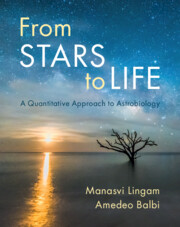9 - Mars
from Part IV - Astrobiological Targets
Published online by Cambridge University Press: 22 November 2024
Summary
Mars has always been one of the most promising targets in the search for current or extinct extraterrestrial life. The chapter commences with a brief summary of Mars’ basic characteristics, before describing its potential for instantaneous habitability (e.g., energy sources, bioessential elements), with an emphasis on the availability of water. This is followed by an exposition of how several aspects of Martian habitability have diminished over time, ranging from extensive atmospheric loss to the shutdown of its dynamo, both of which might have contributed to the emergence of its cold and arid climate today. Nevertheless, some specialised abodes where life may have persisted are touched upon (e.g., deep subsurface). In the last part of the chapter, the contentious history of life detection on Mars – the Viking mission experiments in the 1970s and the meteorite ALH84001 – is reviewed, and forthcoming missions to Mars are surveyed.
Keywords
- Type
- Chapter
- Information
- From Stars to LifeA Quantitative Approach to Astrobiology, pp. 203 - 221Publisher: Cambridge University PressPrint publication year: 2024

